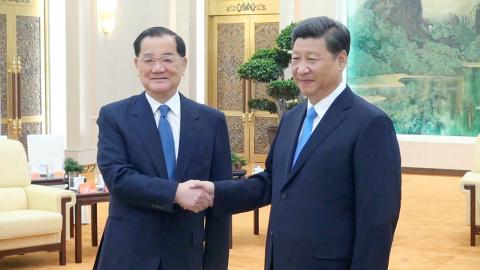It is a historical fact that the then-Chinese Nationalist Party (KMT) government led the war against Japanese aggression from 1937 to 1945, whether on the front lines or behind enemy lines, Presidential Office spokesperson Charles Chen (陳以信) said yesterday.
Chen was responding to remarks by former vice president Lien Chan (連戰), who said during a meeting with Chinese President Xi Jinping (習近平) in Beijing yesterday that the KMT under the leadership of former president Chiang Kai-shek (蔣介石) engaged directly with Japanese troops in major battles, handing the latter a major setback, and that Chinese Communist Party (CCP) troops led by former Chinese leader Mao Zedong (毛澤東) also tied down the enemy behind their lines and eventually defeated the Japanese aggressors.
“The Nationalist forces ... fought a series of decisive and major battles on the front lines and dealt the Japanese military a heavy blow,” Lien told Xi, according to Shanghai news Web site guancha.cn.

Photo: CNA
“The Chinese Communist Party forces led by Mao Zedong effectively pinned down and intercepted the Japanese and the collaborationist militaries on the battlefield behind enemy lines,” added Lien, a former KMT chairman.
Xi said Nationalists and Communists “cooperated and coordinated” in the campaign and that “both made significant contributions to the victory of [the so-called ‘Chinese People’s War of Resistance Against Japanese Aggression and the World Anti-Fascist War’],” China’s Xinhua news agency reported.
“Chinese across the Taiwan Strait must keep history in mind, remember national heroes and become united to savor the fruits of victory and jointly advance the peaceful development of our relations,” Xinhua quoted Xi as saying.
The Presidential Office said that the CCP did little to resist Japanese aggression during the Second Sino-Japanese War.
“Whether it came to engaging in combat with Japanese troops on the front lines or behind enemy lines, it was all led by the Nationalist government, which is a historical fact that cannot be denied,” Chen said.
Chen said that the government’s stance is that “it is inappropriate” for Taiwanese to attend China’s military parade tomorrow — at which Lien is expected to be present.
Beijing has held a series of events to mark the 70th anniversary of the end of World War II, with tomorrow’s military parade considered to be the highlight of the festivities.
The CCP — which defeated the KMT in the Chinese Civil War, forcing the latter to flee to Taiwan — depicts itself as having played the lead role in defeating Japan.
Taiwan said events being held by Beijing distort historical facts, as it was the KMT who fought all the major battles against Japan during an eight-year war before Allied forces intervened.
KMT presidential candidate Hung Hsiu-chu (洪秀柱) yesterday said that she has great respect for Lien, who she said has made significant contributions toward cross-strait peace.
However, Hung added that, given his position, Lien should consider the Taiwanese perspective when making public comments.
Additional reporting by Chang Hsiao-ti

SECURITY: As China is ‘reshaping’ Hong Kong’s population, Taiwan must raise the eligibility threshold for applications from Hong Kongers, Chiu Chui-cheng said When Hong Kong and Macau citizens apply for residency in Taiwan, it would be under a new category that includes a “national security observation period,” Mainland Affairs Council (MAC) Minister Chiu Chui-cheng (邱垂正) said yesterday. President William Lai (賴清德) on March 13 announced 17 strategies to counter China’s aggression toward Taiwan, including incorporating national security considerations into the review process for residency applications from Hong Kong and Macau citizens. The situation in Hong Kong is constantly changing, Chiu said to media yesterday on the sidelines of the Taipei Technology Run hosted by the Taipei Neihu Technology Park Development Association. With

CARROT AND STICK: While unrelenting in its military threats, China attracted nearly 40,000 Taiwanese to over 400 business events last year Nearly 40,000 Taiwanese last year joined industry events in China, such as conferences and trade fairs, supported by the Chinese government, a study showed yesterday, as Beijing ramps up a charm offensive toward Taipei alongside military pressure. China has long taken a carrot-and-stick approach to Taiwan, threatening it with the prospect of military action while reaching out to those it believes are amenable to Beijing’s point of view. Taiwanese security officials are wary of what they see as Beijing’s influence campaigns to sway public opinion after Taipei and Beijing gradually resumed travel links halted by the COVID-19 pandemic, but the scale of

A US Marine Corps regiment equipped with Naval Strike Missiles (NSM) is set to participate in the upcoming Balikatan 25 exercise in the Luzon Strait, marking the system’s first-ever deployment in the Philippines. US and Philippine officials have separately confirmed that the Navy Marine Expeditionary Ship Interdiction System (NMESIS) — the mobile launch platform for the Naval Strike Missile — would take part in the joint exercise. The missiles are being deployed to “a strategic first island chain chokepoint” in the waters between Taiwan proper and the Philippines, US-based Naval News reported. “The Luzon Strait and Bashi Channel represent a critical access

Pope Francis is be laid to rest on Saturday after lying in state for three days in St Peter’s Basilica, where the faithful are expected to flock to pay their respects to history’s first Latin American pontiff. The cardinals met yesterday in the Vatican’s synod hall to chart the next steps before a conclave begins to choose Francis’ successor, as condolences poured in from around the world. According to current norms, the conclave must begin between May 5 and 10. The cardinals set the funeral for Saturday at 10am in St Peter’s Square, to be celebrated by the dean of the College